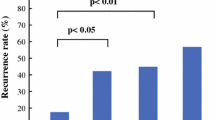Abstract
Purpose
We conducted this retrospective study to evaluate the effectiveness of giving oral anti-cancer drugs for 2 years as postoperative adjuvant chemotherapy to gastric cancer patients.
Methods
The subjects were 76 patients with stage II and III gastric cancer, who underwent curative surgery between 1989 and 2008. We divided the 20 years chronologically into the UFT term (1989–2003) and the S-1 term (2004–2008). The patients from each term were then divided into three groups according to the length of drug administration; namely, the surgery alone group, the 1-year group, and the 2-year group.
Results
The survival time of the 2-year group was better than that of the surgery alone group, not only in the UFT term, but also in the S-1 term (P = 0.0224). Longer relapse-free survival was evident in the S-1 term, especially for the 2-year group (P = 0.0110). A multivariate analysis showed both the stage of the cancer and 2 years of postoperative adjuvant chemotherapy to be independent factors predictive of prolonged survival (P = 0.0040 and P = 0.0022, respectively).
Conclusions
The 2-year administration of oral anti-cancer drugs as postoperative adjuvant chemotherapy might improve the outcome of stage II, III gastric cancer patients. Randomized control trials are warranted to prove the effectiveness of this 2-year regimen.



Similar content being viewed by others
References
Maehara Y, Sugimachi K, Akagi M, Kakegawa T, Shimazu H, Tomita M. Early postoperative chemotherapy following noncurative resection for patients with advanced gastric cancer. Br J Cancer. 1992;65:413–6.
Nakajima T, Nashimoto A, Kitamura M, Kito T, Iwanaga T, Okabayashi K, et al. Adjuvant mitomycin and fluorouracil followed by oral uracil plus tegafur in serosa-negative gastric cancer: a randomised trial. Lancet. 1999;354:273–7.
Macdonald J, Smalley SR, Benedetti J, Hundahl SA, Norman C, Estes NC, et al. Chemoradiotherapy after surgery compared with surgery alone for adenocarcinoma of the stomach or gastroesophageal junction. N Engl J Med. 2001;345:725–30.
Costanzo FD, Gasperoni S, Manzione L, Bisagni G, Labianca R, Bravi S, et al. Adjuvant chemotherapy in completely resected gastric cancer: a randomized phase III trial conducted by GOIRC. J Natl Cancer. 2008;100:388–98.
Nakajima T, Kinoshita T, Nashimoto A, Sairenji M, Yamaguchi T, Sakamoto J, et al. Randomized controlled trial of adjuvant uracil-tegafur versus surgery alone for serosa-negative, locally advanced gastric cancer. Br J Surg. 2007;94:1468–76.
Sakuramoto S, Sasako M, Yamaguchi T, Kinoshita T, Fujii M, Nashimoto A, ACTS-GC Group, et al. Adjuvant chemotherapy for gastric cancer with S-1, an oral fluoropyrimidine. N Engl J Med. 2008;357:1810–20.
Hermans J, Bonenkamp JJ, Boon MC, Bunt AM, Ohyama S, Sasako M, et al. Adjuvant therapy after curative resection for gastric cancer : meta-analysis of randomized trials. J clin oncology. 1993;11:1441–7.
Pignon JP, Ducreux M. P Rougier. Meta-analysis of adjuvant chemotherapy in gastric cancer: a critical reappraisal. J clin oncol. 1994;12:877–8.
Mari E, Floriani I, Tinazzi A, Buda A, Belfiglio M, Valentini M, et al. Efficacy of adjuvant chemotherapy after curative resection for gastric cancer: a meta-analysis of published randomised trials: A study of the GISCAD. Ann Oncol. 2000;11:837–43.
Oba K. Efficacy of adjuvant chemotherapy using tegafur-based regimen for curatively resected gastric cancer: update of a meta-analysis. Int J Clin Oncol. 2009;14:85–9.
Fujii M, Kochi M, Takayama T. Recent advances in chemotherapy for advanced gastric cancer in Japan. Surg Today. 2010;40:295–300.
Maehara Y, Baba H, Sugimachi K. Adjuvant chemotherapy for gastric cancer: a comprehensive review. Gastric Cancer. 2001;4:175–84.
Kodama Y, Kano T, Tamada R, Kumashiro R, Okamura T, Inokuchi K. Combined effect of prophylactic lymphadenectomy and long term combination chemotherapy for curatively resected carcinoma of the stomach. Surg Today. 1982;12:244–8.
Japanese Gastric Cancer Association. Japanese Classification of Gastric Carcinoma, 2nd English Edition. Gastric Cancer 1998;1:10–24.
Ringborg U. Adjuvant chemotherapy—a discussion of some basic principles. Acta Oncol. 1991;30:251–3.
Tannock I. Adjuvant chemotherapy—basic science. The basic science of oncology. 2004. p. 356–7.
Epstein RJ. Maintenance therapy to suppress micrometastasis: the new challenge for adjuvant cancer treatment. Clin Cancer Res. 2005;11:5337–41.
Hanaue H, Kurosawa T, Kitano Y, Miyakawa S, Nemoto A, et al. Anticancer drug distribution in lymph and blood during adjuvant chemotherapy after surgery for gastric carcinoma. A study with a combined preparation of 1-(2-tetrahydrofuryl)-5-fluorouracil and uracil. Cancer. 1987;59:1571–6.
Sugimachi K, Maehara Y, Ogawa M, Kakegawa T, Tomita M. Dose intensity of uracil and tegafur in postoperative chemotherapy for patients with poorly differentiated gastric cancer. Cancer Chemother Pharmacol. 1997;40:233–8.
Kaibara N, Soejima K, Nakamura T, Inokuchi K. Postoperative long term cancer chemotherapy for advanced gastric cancer. Surg Today. 1976;6:54–9.
Okudaira Y, Sugimachi K, Inokuchi K, Kai H, Kuwano H, Matsuura H. Postoperative long term immunochemotherapy for esophageal carcinoma—5 year survival. Surg Today. 1982;12:249–56.
Maehara Y. S-1 in gastric cancer: a comprehensive review. Gastric Cancer. 2003;6:2–8.
Japanese Gastric Cancer Association. Gastric cancer treatment guidelines. 3rd edn. Japan: Japanese Gastric Cancer Association; 2010. p. 26–27 (in Japanese).
Tanaka F. UFT (Tegafur and Uracil) as Postoperative Adjuvant Chemotherapy for Solid Tumors (Carcinoma of the Lung, Stomach, Colon/Rectum, and Breast): Clinical Evidence, Mechanism of Action, and Future Direction. Surg Today. 2007;37:923–43.
Conflict of interest
Toshiro Okuyama and his co-authors have no conflict of interest.
Author information
Authors and Affiliations
Corresponding author
Rights and permissions
About this article
Cite this article
Okuyama, T., Korenaga, D., Edagawa, A. et al. Prognostic effects of oral anti-cancer drugs as adjuvant chemotherapy for 2 years after gastric cancer surgery. Surg Today 42, 734–740 (2012). https://doi.org/10.1007/s00595-012-0129-5
Received:
Accepted:
Published:
Issue Date:
DOI: https://doi.org/10.1007/s00595-012-0129-5




